Overview
Food and agriculture are often at the center of struggles regarding climate change, capitalism, poverty, and Indigenous struggles. The Indigenous and peasant communities are leading the way in sustainable, just, and equitable paths to food and agriculture.
Despite the industrial food web using up the most resources and producing the most emissions, they only actually produce ~30% of the world's food. Indigenous and peasant communities keep the world fed sustainably by only using a fraction of the resources to produce ~70% of the world's food.
Ensuring an equitable future for our food systems requires a global paradigm shift, away from industrialized agriculture towards regenerative, resilient, and just food systems grounded in Food Sovereignty.
Food sovereignty goes far beyond just providing food for everyone. It values cultural diversity, biodiversity, traditional knowledge, and addresses social justice and environmental degradation. Food sovereignty uses social mobilization to address massive widespread rural disintegration while also addressing the pressing issue of climate change. It aims to focus social and political actions on communities to promote local mobilization and cooperation on a regional, as well as on a much broader, geographic scale.
As a concept, food sovereignty was put forward at an international level by La Via Campesina at the United Nations Food and Agriculture Organization’s World Food Summit in 1996. In this summit LVC presented a set of mutually supportive principles that can ground local and global transitions towards an alternative just food system:
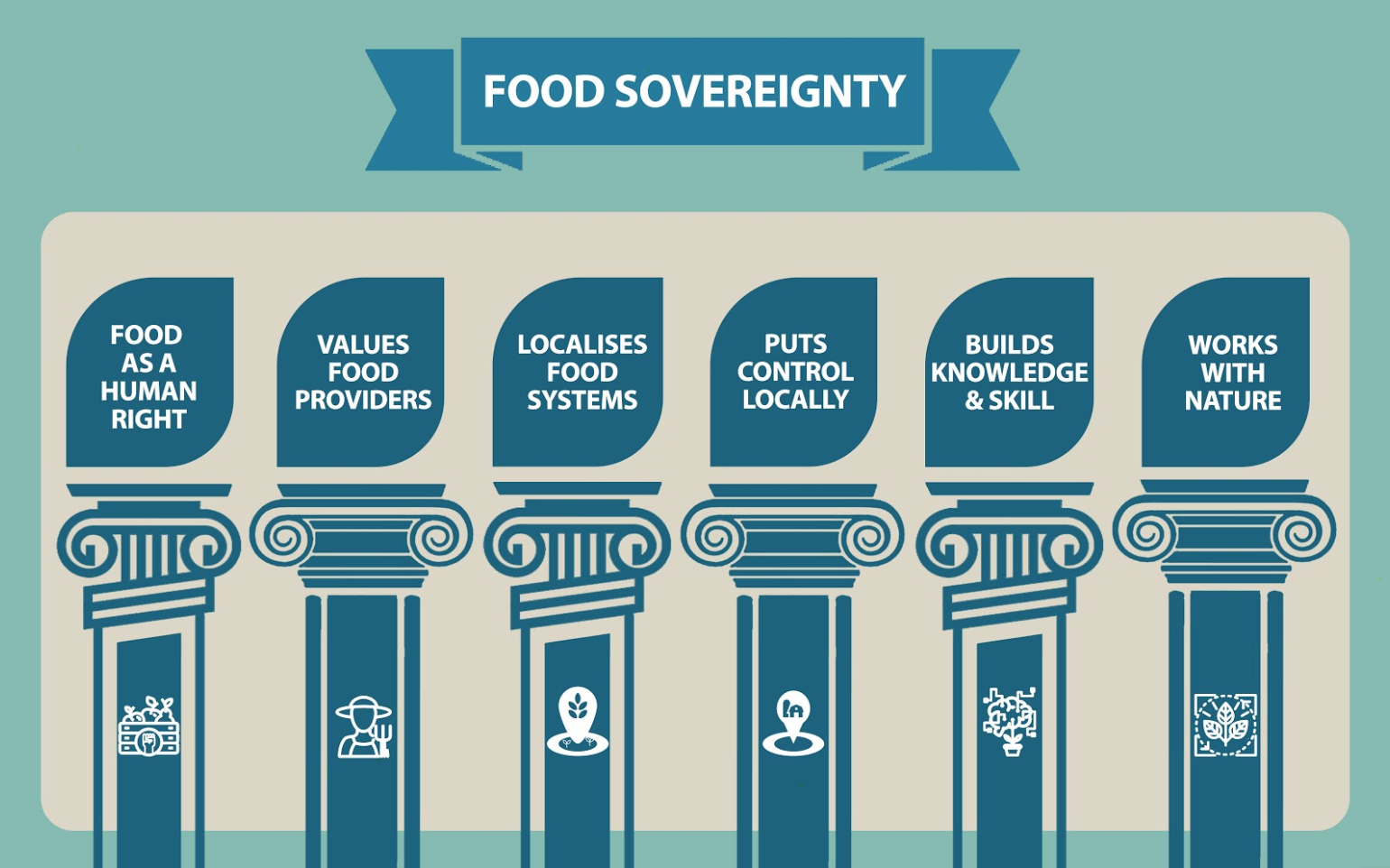
Source: Altieri, M. A., Nicholls, C. I., Henao, A., & Lana, M. A. (2015). Agroecology and the design of climate change-resilient farming systems. Agronomy for sustainable development. Design and edit by Christian Tandazo.
This section will provide resources to understand the role that capitalism and industrial agricultural actors have in exacerbating climate change, world hunger, Indigenous oppression, and exploitation of labor, as well as resources from frontline communities that fight against the injustices surrounding food and agriculture by either direct action or by serving as models of alternatives.
Way Forward
Way Forward 1:
Agroecology:
Agroecology centers the regeneration of the land while providing food, medicine, and other community needs. It is simultaneously focused on biodiversity and cultural diversity, as the two are inextricably linked. There are a vast range of agroecology projects, as each are localized to the needs of their community, human, water, animal, plant, and geological communities included.
Agroecology is the opposite of industrial agriculture. It is a holistic land-based approach to farming practices, knowledge that has been produced and conserved by peasant, Indigenous, and small-scale family farmers around the world.
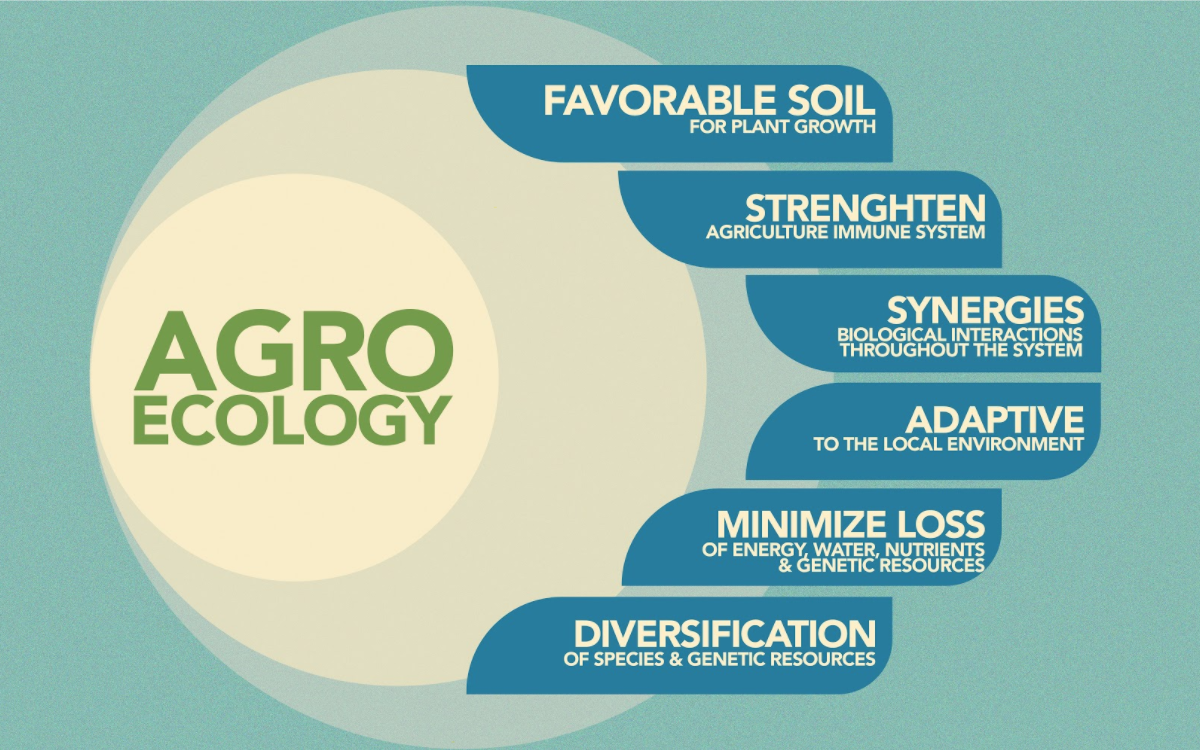 Source: Altieri, M. A., Nicholls, C. I., Henao, A., & Lana, M. A. (2015). Agroecology and the design of climate change-resilient farming systems. Agronomy for sustainable development. Design and edit by Christian Tandazo.
Source: Altieri, M. A., Nicholls, C. I., Henao, A., & Lana, M. A. (2015). Agroecology and the design of climate change-resilient farming systems. Agronomy for sustainable development. Design and edit by Christian Tandazo.
The knowledge of Peasant and Indigenous farmers is the key component in the design of agroecological farming practices. This knowledge is place-based, locally-adapted, and culturally-relevant, which has been passed down through generations. Industrial agriculture poses a threat to this knowledge. Farm land expropriation by agribusiness and transnational corporations continue to displace peasant and Indigenous farmers from their traditional territories, through this process incredible ancestral agricultural knowledge is lost.
(For more on Peasant Right’s please see “Way Forward 5”)
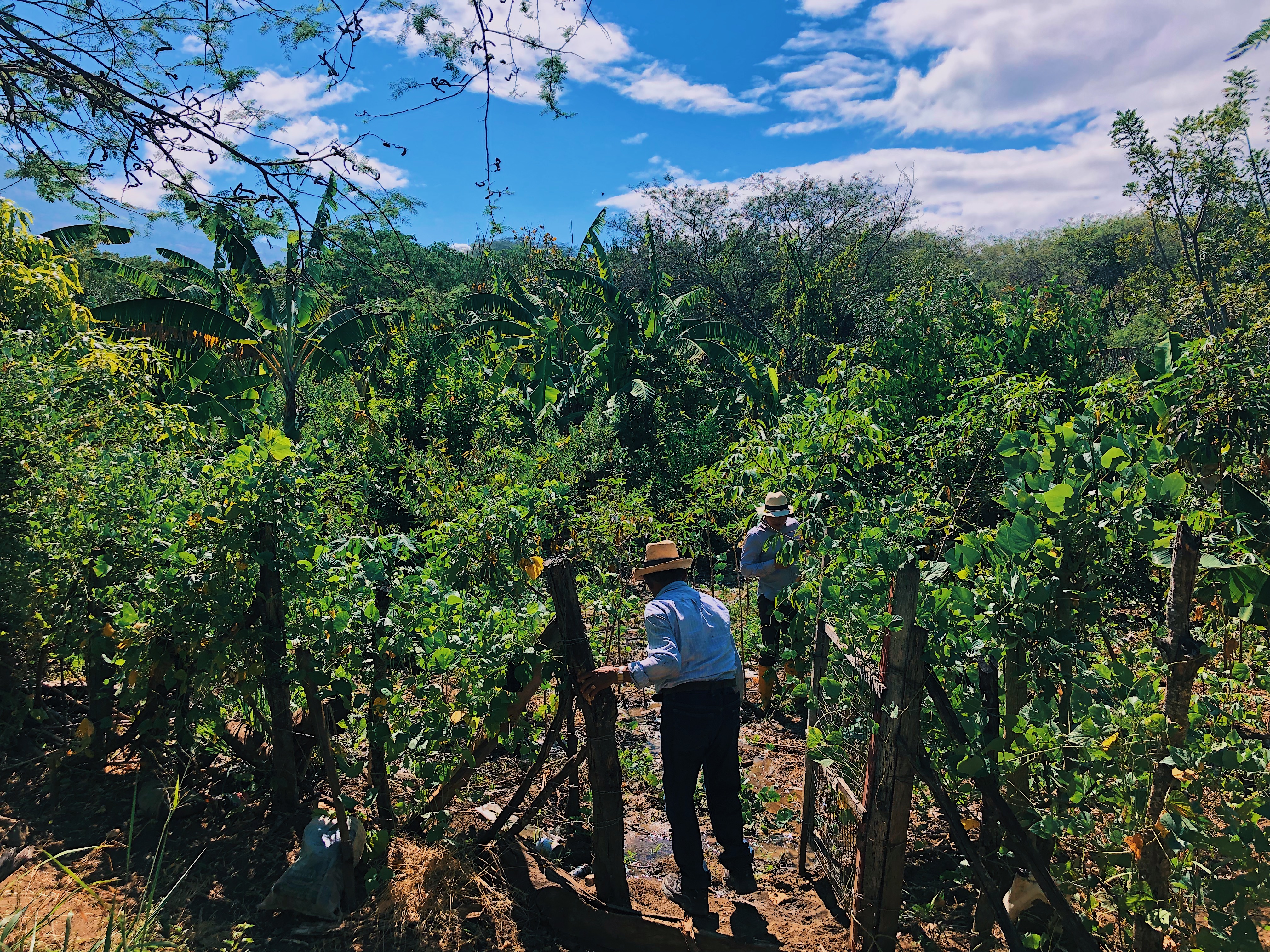 Agroecology small-scale family farming in Catacocha, Loja, Ecuador. Photo Credit: Christian Tandazo
Agroecology small-scale family farming in Catacocha, Loja, Ecuador. Photo Credit: Christian TandazoAs farm management practice, agroecology would: drastically reduce the use of fossil fuels for chemical and synthetic fertilizers, and pesticide production used in conventional agriculture; potential to mitigate through soil and plant rejuvenation for carbon sequestration; stormwater filtration; has the flexibility and diversity required to allow adaptation for changing climate conditions; and ensure food security.
Some of the multiple benefits of Agroecology include:
- Provide stable yields and tackle hunger: agroecological systems chieve more stable levels of total yield per unit area.
- Linking food to territories
- Nutrition, health and sustainable livelihoods
- Preservation and sharing of cultural diversity and knowledge
- Transparency and access to information
- Central role of rural women
- Restoring ecosystems, soil health, and preserving biodiversity
- Preservation and renewal of genetic resources.
- Harnessing food systems to stop climate change
- Resilience to conflict and environmental disasters.
Agroecology requires we partake in a global paradigm change in our social, political, economic, and cultural relations and structures, but most importantly a change in the relationship between nature and society.
As the climate crisis increases the uncertainty of raising temperatures, intense storm patterns, droughts, and recently the emergence of the COVID-19 pandemic, it is imperative we transition from industrial agriculture towards agroecology and food sovereignty. Agroecology is the only model capable of feeding millions of people and addressing the climate crisis, however, this can only be achieved under the leadership of its protagonists: Indigenous, peasant, and small-scale family farmers.
Organizations leading the way in Agroecology:
Black Earth Farms Collective (USA)
Black Earch Farms Collective is composed of skilled Pan-African and Pan-Indigenous peoples who study and spread ancestral knowledge and contemporary agroecological practices to train community members to build collectivized, autonomous, and chemical free food systems in urban and peri-urban environments throughout the Occupied Karkin Ohlone & Chochenyo Territory.Asociación ANDES (Peru):
A Quechua organization that promotes the rights of Indigenous peoples and the biodiversity of food and agricultural systems. ANDES works to support Indigenous peoples through independent research and analysis, strategies based on the development of collective biocultural heritage, networking at the local, regional and international levels, and the promotion of new forms of cooperation and alliances.Soul Fire Farm Inc. (USA):
A BIPOC-centered community farm committed to ending racism and injustice in the food system. With deep reverence for the land and wisdom of our ancestors, we work to reclaim our collective right to belong to the earth and to have agency in the food system. Universidad Ixil (Guatemala)
This University challenges western educational models. The university prioritises oral tradition over written and within its curriculum, promotes the ancestral knowledge born of that same land. Students engage in extensive fieldwork and research in their own communities, with the elders and Indigenous authorities as their principal sources of information.Focus on the Global South (Global)
Focus on the Global South is an activist think tank in Asia providing analysis and building alternatives for just social, economic and political change. One of the issues they cover is Food Sovereignty and Agroecology. Organización Boricuá de Agricultura Ecológica de Puerto Rico
Organización Boricuá, a member organization of La Via Campesina is a grassroots organization that was founded 30 years ago and is one of the leaders of the agroecology movement in Puerto Rico working to connect, teach, and support farmers and spread the use of agroecology across the country.Proyecto Agroecológico El Josco Bravo
Josco Bravo is an agro-ecological production and education project located in the foothills of the town of Toa Alta, Puerto Rico.More Resources on Agroecology:
Books, Articles, and Reports:- Asociación ANDES Knowledge Portal
- BIPOC Led Gardening Projects
- Duru, Michel, Olivier Therond, and M’hand Fares. 2015. “Designing Agroecological Transitions; A Review.” Agronomy for Sustainable Development 35(4): 1237–57
- Farming While Black by Leah Penniman
- Friends of the Earth International. 2018. “Agroecology: Innovating for Sustainable Agriculture & Food Systems”. Who Benefits? Series. 1-32.
- Figueroa-Helland, L., Thomas, C., and Pérez Aguilera, A.. (2018). “Decolonizing Food Systems: Food Sovereignty, Indigenous Revitalization, and Agroecology as Counter-Hegemonic Movements.”
- Food & Land Sovereignty Resource List for COVID-19
- Gliessman, Stephen M. (2008). “Agroecology and Agroecosystems.” In Sustainable Agriculture and Food, Agriculture and the Environment, London: Earthscan.
- IPES-Food. (2018). Breaking Away from Industrial Food and Farming Systems Seven: case studies of agroecological transition.
- IPES-Food. (2016). From Uniformity to Diversity: A paradigm shift from industrial agriculture to diversified agroecological systems.
- Ixil University and the Decolonization of Knowledge by Giovanni Batz
- World Forum of Fisher Peoples. 2017. “Agroecology and Food Sovereignty in Small Scale Fisheries”. Transnational Institute.
- Roces, Irene García, Marta Soler Montiel and Assumpta Sabuco i Cantó. 2014 “Perspectiva ecofeminista de la Soberanía Alimentaria: La Red de Agroecología en la Comunidad Moreno Maia en la Amazonía brasileña.”
Way Forward 2:
Indigenous Forest Gardens
Indigenous Forest Gardens, Forest Garden Systems, and Sacred Forests are highly biodiverse and sustainable agroforestry systems which have been cultivated and nurtured by indigenous peoples.
Forest Gardens are based in polyculture, symbiotic plant relationships, cycles of forest and plant growth, a cosmology of the land as sacred, and traditional ecological knowledge and practices that have been passed down through generations.
The Mayan Milpa system is practiced by most rainforest populations close to the equator, the most densely biodiverse areas in the world today and the locations at highest risk for biopiracy and extractivism. Milpa systems run over cycles of time, not singular farming seasons. Traditionally the cycle might be anywhere from 30 to 50 years, with over 1300 species throughout a given cycle.
These systems include agroecological methods such as partial burns to enhance plant growth followed by the introduction of small crops such as maize. Indigenous forest gardens not only have been proven to increase forest biodiversity, but give communities and towns food sovereignty.
Forest garden systems are used around the world; in India, over 100,000 sacred forests exist. Forest gardens and sacred forests have a high number of medicinal plants and higher species diversity than surrounding forests and even government-protected forestland. Nowadays, the Milpa exists in addition to the home garden and a middle distance garden.
Forest gardens are but one example of agroecology and are based in indigenous cosmologies that surround the sacredness of the land. As many of these practices have been decimated over time through settler colonialism, indigenous led initiatives such as the Zapatista Food Forest, are working on ways to recover, teach, and preserve indigenous knowledge and practices.
Organizations leading the way in Indigenous Forest Gardens:
MesoAmerican Research Center:
The MesoAmerican Research Center seeks to develop a broad understanding of the people, cultures, and environment of the greater Mesoamerican region of Mexico and Central America. Research of the center has emerged in the context of Anthropology and Archaeology, yet is wholly interdisciplinary in focus. The MesoAmerican Research Center continues to maintain its focus on the Maya forest and the broad fields of study in the region. El Pilar Forest Garden Network (Guatemala)
The El Pilar Forest Garden Network is a group of Maya farmers who are keeping alive Maya cultural traditions, promoting sustainable agriculture, conserving biodiversity in the Maya Forest, and educating the public on the value of their time-honored strategies.Forest Peoples Programme:
The Forest Peoples Programme is a human rights based organization that works with forest peoples globally to secure their rights to land and livelihoods. FPP works to support indigenous organizations and forest peoples in advocating for indigenous forest management and assists with handling outside powers that threaten indigenous land rights.More Resorces on Indigenous Forest Gardens:
- The Maya Forest Garde: Eight Millennia of Sustainable Cultivation of the Tropical Woodlands. By: Anabel Ford and Ronald Nigh
- Barbhuiya, A., U. Sahoo, and K. Upadhyaya. 2016. “Plant Diversity in the Indigenous Home Gardens in the Eastern Himalayan Region of Mizoram, Northeast India.” Economic Botany 70(2): 115–31.
- Campanha, Mônica Matoso et al. 2004. “Growth and Yield of Coffee Plants in Agroforestry and Monoculture Systems in Minas Gerais, Brazil.” Agroforestry Systems 63(1): 75–82
- Gabay, Mónica, and Mahbubul Alam. 2017 "Community Forestry and Its Mitigation Potential in the Anthropocene: The Importance of Land Tenure Governance and the Threat of Privatization." Forest policy and economics, v. 79, pp. 26-35.
- Wartman, Paul & Acker, Rene & Martin, Ralph. (2018). Temperate Agroforestry: How Forest Garden Systems Combined with People-Based Ethics Can Transform Culture. Sustainability. 10. 2246. 10.3390/su10072246.
- Ormsby, Alison & Bhagwat, Shonil. (2010). Sacred Forests of India: A Strong Tradition Of Community-Based Natural Resource Management. Environmental Conservation. 37. 320 - 326. 10.1017/S0376892910000561
- IWGIA, PINGOS. Tanzania Indigenous People Policy Brief: Climate Change Mitigation Strategies and Eviction of Indigenous Peoples from their ancestral lands: The Case of Tanzania
Way Forward 3:
Queer & Trans Liberation / Gender Justice
“Mainstream understandings of botany and ecology have been used to justify violence against queer, trans, indigenous, and people of color; female, disabled, and marginalized bodies. The field of queer ecology seeks to reimagine the natural world in a way that values and affirms all life.” - Moretta Browne, Clare Riesman, and Edgar Xochitl
Queer and Trans Liberation, along side Gender Justice has been put forth as a solution for climate justice by many BIPOC women, trans people, and two spirit leaders because an analysis of gender and the violences it inflicts through patriarchy, homophobia, and transphobia, directly underpins the roots of the climate crisis. As shown in the sections above, food sciences have been deeply influenced by capitalism. Queer ecology rejects hetero-patriarchal science norms and forms of linear understanding.
It’s clear that women, trans people, and two spirit people are disproportionately left on the front lines and bear the brunt of climate change as a convergence of crises. As such, attention and efforts need to be focused on securing their safety, autonomy, and futures – these must be pursued through gender self-determination, and redistribution of resources, not a top down approach.
Furthermore, many BIPOC women, queer people, trans people, and two spirit people have been, and are already building resilient futures out of necessity. Mutual aid efforts around food security, healthcare access, diaster relief, harm reduction and more, are all efforts born from BIPOC queer communities because the system today has never worked for them. When looking towards solutions to building community resiliency that prioritizes agency of us that are most vulnerable, the BIPOC queer community is leading the way.
Organizations leading the way:
Our Climate Voices
Our Climate Voices seeks to make climate change personal through localized and community based storytelling and organizing. They put together a great listening series on the relationship between Climate Justice and Queer and Trans Liberation. La Via Campesina
La Via Campesina, the largest international member based peasant’s movement, prioritizes the needs of women because they see “Food Sovereignty as a feminist issue.” Practices such as Agroecology and food sovereignty promote women’s autonomy as when capitalism and the norms of domination of women by men and men of the earth are abolished, all life becomes safer.- Keeping the Struggles of Peasant Women Alive, La Via Campesina
- Women’s struggles for a Peasant and Peoples’ Feminism
More Resources on Queer & Trans Liberation / Gender Justice:
- Brady, A., Torres, A., & Brown, P. (2019). What the queer community brings to the fight for climate justice.
- Brimm, Katie. (2019) We are Natural: California Farmers Reimagine the World through Queer Ecology
- Kabir, Kareeda. (2018) How Climate Change in Bangladesh Impacts Women and Girls, NYU Press. Queer Ecology
Way Forward 4:
Peasant Rights
Peasants, small scale farmers and fishers, family farmers, pastoralists, hunters and gatherers, have been at the forefront of the fight for food sovereignty against agribusiness and transnational corporations. Unfortunately, taking a stand against corporations has propelled violence agaisnt peasants and workers, as more people continue to be displaced from their traditional farming lands at the hands of agribusinesses and transnational corporations. They have been criminalized or even killed for the simple act of saving seeds to feed their families.
Peasants are safeguards of agrobiodiversity, biocultural diversity, and traditional agricultural knowledge that foster a relationship of reciprocity, with the land, water, soils, non-human kin, and microbial diversity. Peasants also care for seeds, contributing to global seed diversity by protecting and sometimes interbreeding 50,00 - 60,000 wild relatives of cultivated species at no cost.
Through these practices, peasants have become the main or sole food providers to more than 70% of the world’s population, while Industrial Agriculture only feeds 30%. Peasants produce this amount of food with less than 25% of the resources the industrial food system uses - including land, waste, fossil fuels - used to get all of the world’s food to the consumer’s table.
The ancestral knowledge and practices that peasants hold are vital to global food security, provide an opportunity to drastically reduce emissions from the agriculture sector, revitalize depleted soils, preserve biodiversity, and produce healthy and culturally relevant foods.
However, peasants alone won’t be able to solve the world’s crises and threats to food security, therefore, it is imperative to show support for peasants in the fight and struggle for their rights, whether at the policy level or on the ground.
Organizations leading the fight for Peasant’s Rights:
La Via Campesina (LVC)
LVC is the largest transnational agrarian movement today. LVC actively builds alliances with other social movements, bringing together millions of peasants, small and medium size farmers, landless people, rural women and youth, indigenous people, migrants and agricultural workers from around the world; trying to respond to the impacts of capitalist development in food, agriculture and land-use. LVC is mainly recognized for championing and developing the Food Sovereignty paradigmLVC is built on a strong sense of unity, solidarity, it defends peasant, Indigneous and small-scale family farmers for food sovereignty as a way to promote social justice and dignity and strongly opposes corporate driven agriculture that destroys social relations and nature.
- Illustration - UN Declaration on the Rights of Peasants and Other People Working in Rural Areas (UNDROP)
- The United Nations Declaration on the Rights of Peasants: A Tool in the Struggle for our Common Future
Movimiento Campesino a Campesino (MCAC) - (Central America and Cuba)
MCAC, or Farmer to Farmer, is a grassroots movement that originated in the early 1970s in Guatemala and expanded to Mexico, Nicaragua, and Cuba. It was pioneered by Mayan campesinos who applied methods of soil and water conservation in their farming practices. They later proceeded to share this knowledge with other peasant farmers in Mexico. This was has been described as peasant pedagogy, which generates effective site-specific agroecological solutions, encourages forms of non-hierarchical communication and leadership structures. This for of pedagogy was later spread throughout Central America and the Caribbean.The peasant seeds network (France)
The Peasant Seeds Network leads a movement of collectives rooted in the territories which renew, disseminate and defend peasant seeds, as well as the associated know-how and knowledge.These collectives are inventing new seed systems, a source of cultivated biodiversity and autonomy, in the face of the industry's monopoly on seeds and its patented GMOs.
More Resources on Peasant Right’s:
- Bocci, R. & Chable, V. (2009). Peasant seeds in Europe: stakes and prospects.
- ETC Group. (2017). Who Will Feed Us?: The Peasant Food Web vs. The Industrial Food Chain.
- Gevers, C., van Rijswick, H., & Swart, J. (2019) Peasant Seeds in France: Fostering A More Resilient Agriculture
- Rosset, Peter & Sosa, Braulio & Jaime, Adilén & Avila, Rocio. (2011). The Campesino-to-Campesino Agroecology Movement of ANAP in Cuba: Social Process Methodology in the Construction of Sustainable Peasant Agriculture and Food Sovereignty.
Who’s In The Way
Obstacle 1:
Industrial Agriculture
Industrial agriculture (IA) involves huge monoculture farms that prioritize crops for biofuel production rather than produce. These farms pollute local water supplies, erode the soil, and are less resilient to climate disasters due to their lack of crop diversity. This system uses more than 75% of the world’s agricultural land, a process that destroys 75 billion tons of topsoil annually.
It is a linear sequence of links running from production inputs: crop and livestock genomics, pesticides, fertilizers, farm machinery, veterinary medicine, to transportation and storage, then to milling processing and packaging, to consumption outcomes: wholesaling, retailing, restaurants, delivery of home, and food lost and wasted.
Monoculture farms are far less resilient to climate disasters than agroecological farms, leaving IA farmers with no income or produce after climate disasters, such as Hurricane Maria in 2017. They also disconnect consumers from peasants and land, altering our food customs and practices and accelerating the loss of agrodiversity.
Globalized IA is responsible for 50% of global greenhouse gas emissions, one third of which comes from livestock, and accounts for 85-90% of all agricultural emissions. IA requires intensive pesticide and fertilizer use which ruins the soil, chemicalizes the land, water, and crops, and exacerbates the impacts of climate change
In addition, IA uses 70% of all withdrawn water resources and most of it is used for irrigation, livestock – which accounts for 27% of water use, and processing. The use of massive amounts of drinking water in IA threatens the stability of water and food security throughout the globe as food is dependent on water availability.
Over the last 50 years much of the world’s agriculture has been transformed from traditional peasant agriculture into IA from traditional peasant agriculture, simultaneously, in the last 50 years humans have tripled water extraction withdrawing about four thousand cubic kilometers of water globally each year.
The rapid expansion of Industrial Agriculture and globalization of food systems has narrowed the agrobiodiversity world’s food supply, increasing the likelihood of catastrophic crop failure in the event of drought, heavy rains, and outbreaks of pest and disease. We are currently witnessing these catastrophic climate events unfold, such as the wildfires in the worlds’ forests, droughts in farmland, locust swarms in Africa, and the COVID-19 pandemic – all of which have been exacerbated by climate change.
Organizations working to dismantle Industrial Agriculture:
Timbaktu Collective
The Timbaktu Collective, an India-based NGO, aims to enable marginalised rural people, landless labourers, and small and marginal farmers particularly women, children, youth, Dalits and the people with disabilities, to enhance their livelihood resources, get organised and work towards social justice and gender equity and lead life in a meaningful and joyous manner.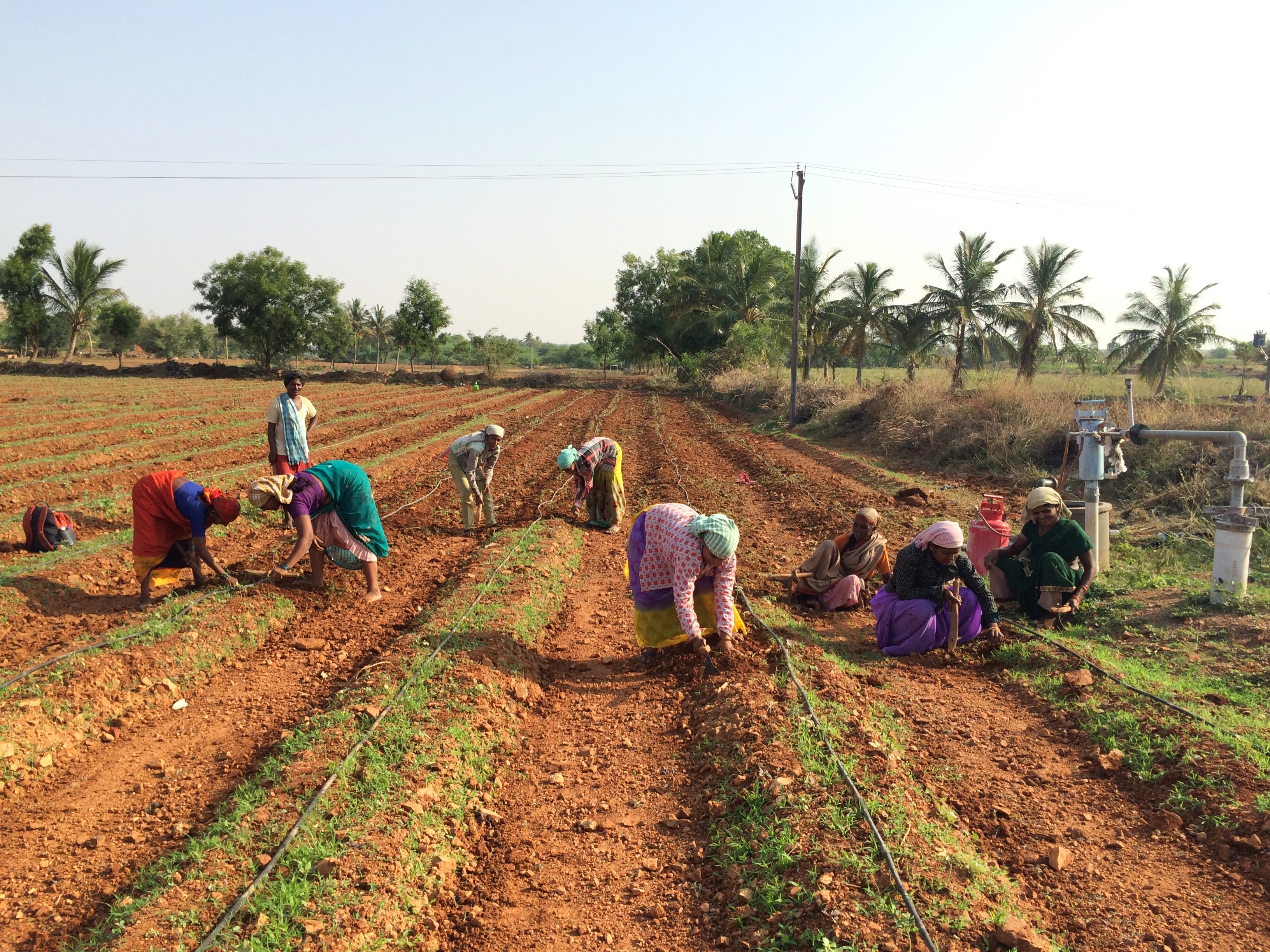 Organic Farmers in the Anantapur District, Andhra Pradesh, India in 2015
Photo credit: Laura Langner
Organic Farmers in the Anantapur District, Andhra Pradesh, India in 2015
Photo credit: Laura LangnerTheir vision is for rural communities to take control of their own lives, govern themselves and live in social, gender, and ecological harmony while maintaining a sustainable lifestyle.
- Organic Farmer Cooperative Program - Assists farmers in switching from industrial agriculture to organic farming, re-empowering farmers strapped by loans (due to high costs of chemical inputs & monoculture) through the support of the cooperative & knowledge sharing through farmers
- Dharani - Removes the middleman and allows organic cooperative farmers to directly profit from their crops & be economically protected through good/bad seasons. They attempt to engage with the market through a Cooperative model, with larger numbers being a source of strength and solidarity.
Navdanya
Vandana Shiva’s seed saving non-profit which has created 122 community seed banks in India to directly counteract industrial agriculture’s patenting of seeds and allow farmers to regain autonomy. ETC Group
ETC Group addresses the socioeconomic and ecological issues surrounding new technology that impact the world’s marginalized people. They investigate the erosion of ecology, culture, and human rights; monitor global governance issues including corporate control and concentration of technologies; and the development of new technologies, in particularly agricultural but also other technologies. They work closely with partner civil society organizations and social movements, especially in Africa, Asia, and Latin America.
More Resources on dismantling Industrial Agriculture:
Books, Articles, and Reports:
- Campbell, B. M., D. J. Beare, E. M. Bennett, J. M. Hall-Spencer, J. S. I. Ingram, F. Jaramillo, R. Ortiz, N. Ramankutty, J. A. Sayer, and D. Shindell. (2017). Agriculture production as a major driver of the Earth system exceeding planetary boundaries
- IPES-Food. 2017. Unravelling the Food–Health Nexus: Addressing practices, political economy, and power relations to build healthier food system
- Jacquet, P. &, & Pachauri, R. K., Tubiana, L. (2012). Towards Agricultural Change? Development, the Environment and Food
Obstacle 2:
Agribusiness, Transnational Corporations (TNCs), & Mega-Mergers
Agribusiness is the business of Industrial Agriculture and plays a role as a global hegemonic power pushing for land and water resource acquisition.
In the last couple of decades agribusiness corporations have been merging at an unprecedented rate. In 2001, six companies were the global leaders: Monsanto, Syngenta, Dupont, Dow Chemical, Bayer CropScience and BASF. These companies became known as the “the big six” and by 2013 they controlled 63% of comercial seed sales globally, and 75% of agricultural chemical sales around the world.
Back in 2016, there were The Big Six & ChemChina:
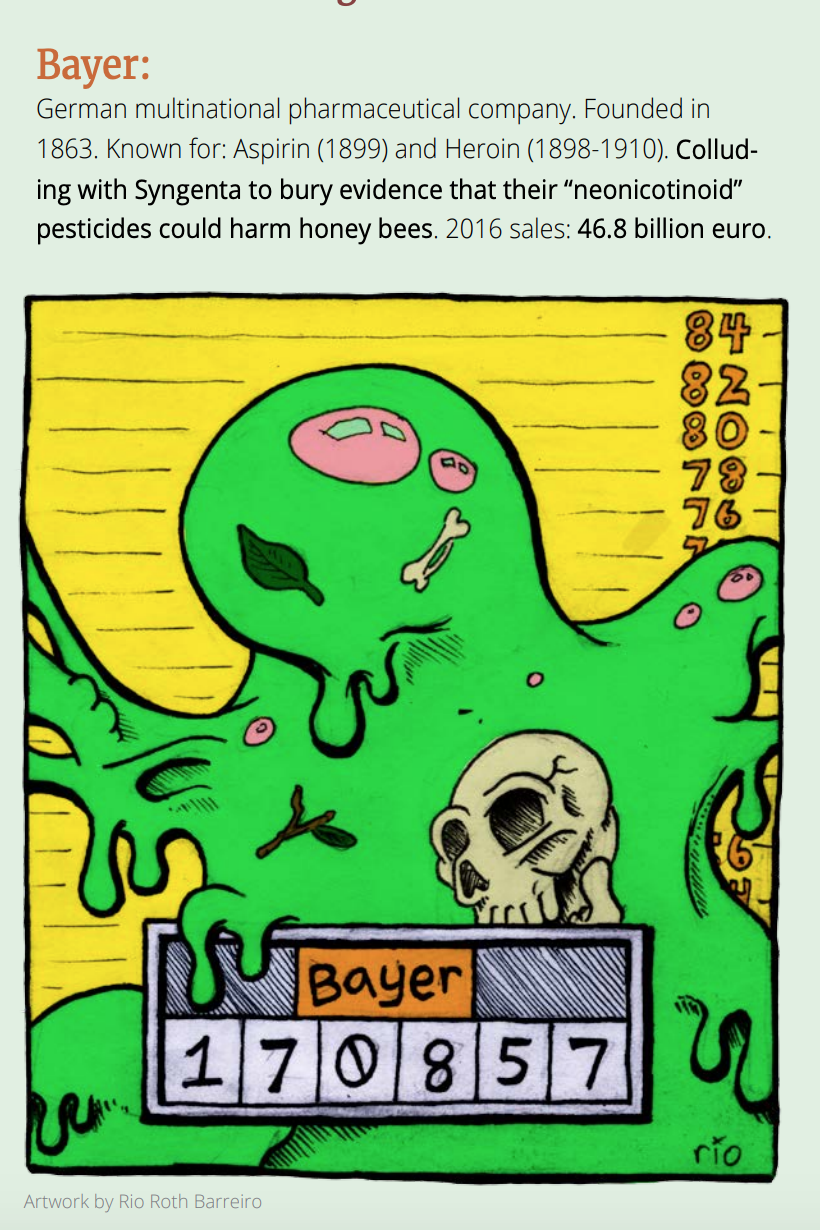
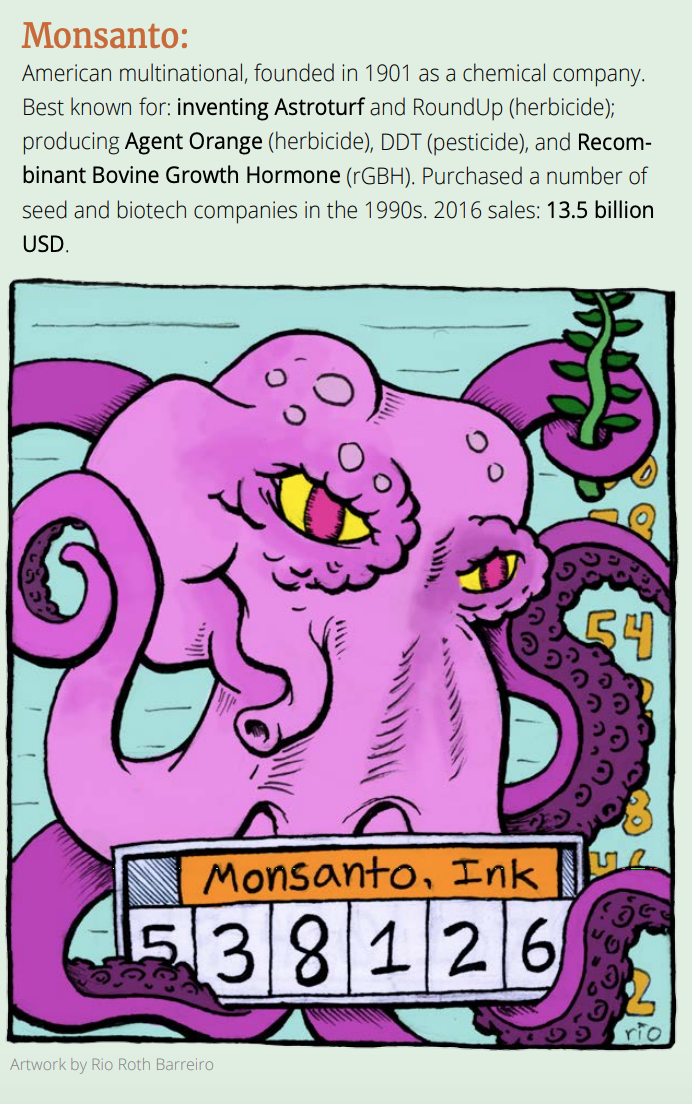



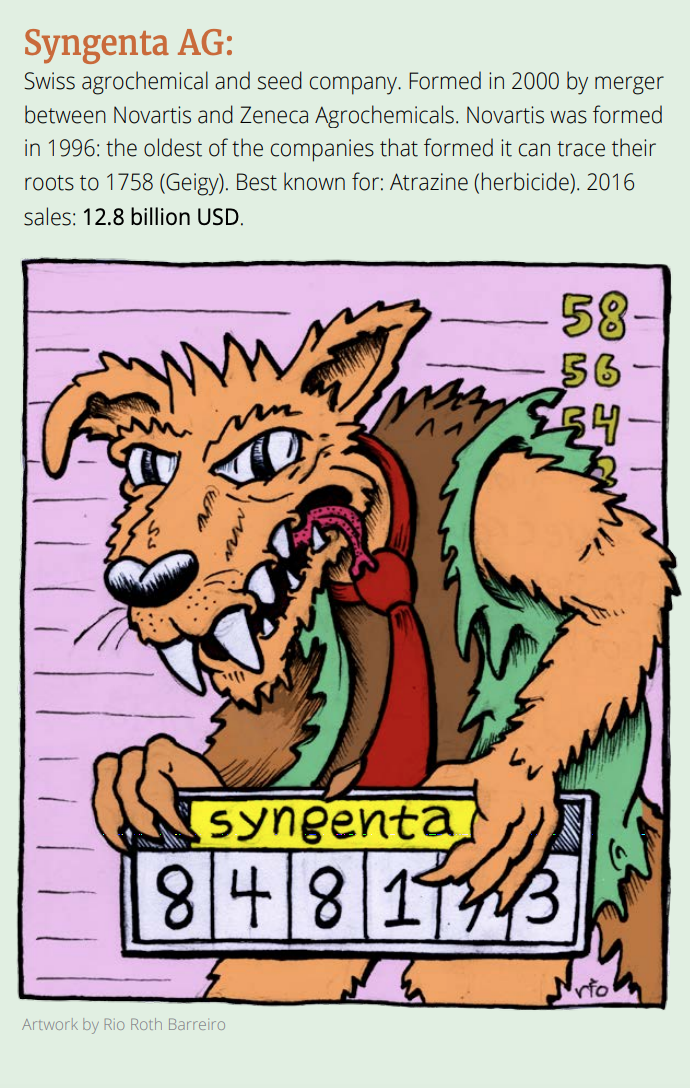

Then, in 2017, there was a push for further consolidation of monopoly corporatist power with the announcement of three agribusiness mega-mergers: ChemChina-Syngenta, Bayer-Monsanto, and Dow-DuPont. These mergers were approved by industry regulators.
The Big Six were now The Big Four: Bayer-Monsanto, DowDupont/Corteva, ChemChina-Syngenta, BASF.
Later, Dow-Dupont split into three chemical corporations in 2019: Dow, DuPont, and Corteva Agriscience.
Dow focuses on performance chemicals, chemical additives, and packaging. Market cap: $33.5 billion
Dupon focuses on specialty material, high-growth materials, and nutrition. Market cap: $49.6 billion
Corteva Agriscience focuses on agricultural chemicals and seeds. Market cap: $21.8 billion. Derives more than half its revenue from North America.
TNCs are involved at multiple levels of natural resource acquisition and degradation. TNCs have displaced local food retailers and promoted worldwide convergence of urban diet on a narrow range of staple foods as well as meat, edible oils, fats, sugars, and cheap unhealthy processed foods, contributing to the global epidemic of obesity and diet-related diseases.
Some well-known TNCs are*: Sime Darby Bhd, Dole Food Company Inc, Fresh Del Monte Produce, Cargill, Deere & Company, Nestle SA, Unilever, Kraft Foods Inc., Mars Inc., Coca Cola, Suntory Ltd.
*Source: World Investment Report: Transnational Corporations, Agricultural Production and Development.
Agribusiness and TNCs have created monopolies to hold power and control of our food systems. The world can no longer sustain this.
Organizations leading the fight against Agribusiness, Transnational Corporations, and Mega-Mergers:
La Via Campesina (LVC)
As the largest transnational agrarian movement, LVC has been the leader in the fight against agribusiness, TNCs, and extractive industries. They have developed multiple international campaigns to prevent further consolidation of power from corporations.Farmworker Association of Florida
The Farmworker Association of Florida, a member organization of La Via Campesina, focuses on protecting farmworkers and rural poor communities in Florida from the injustices and dangers of working on industrial agriculture farms including continual exposure to pesticides, extremely hot temperatures, and economic and physical exploitation as undocumented migrant workers and the surrounding community. Coalition of Immokalee Workers
This is a worker-based human rights organization internationally recognized for its achievements in fighting human trafficking and gender-based violence at work. - Fair Food Program
- Anti Slavery Program
- Campaign for Fair Food
- Facts and Figures on Florida Farmworkers
More Resources on dismantling Agribusiness, TNCs, and Megamergers:
Books, Articles, and Reports:
- Gonzalez, Carmen. 2016. The Environmental Justice Implications of Biofuels. Los Angeles: UCLA.
- Food and Water Watch. (2020). DOJ Fast Tracking Lethal Agricultural Mega-Mergers
- Organisation for Economic Co-operation and Development. (2018).Concentration in Seed Markets: Potential Effects and Policy Responses
- Reuters. (2020). ChemChina, Sinochem merge agricultural assets: Syngenta
- Ribeiro, Silvia. (2020). Breeding the Next Pandemic
- Starbuck, Amanda, C. (2020). Mega-Mergers Are As Guilty As the Pandemic for our broken Food Supply Chain.
- ETC Group & IPES-Food. (2017). Too Big to Feed: Exploring the impacts of mega-mergers, consolidation and concentration of power in the agri-food sector
- Transnational Institute. (2019). Mega-Mergers and the fight for our food system.
Obstacle 3:
International Financial Institutions (IFIs)
World Trade Organization (WTO)
The WTO Agreement on Agriculture (AoA) contained numerous ambiguities that enabled wealthy nations to subsidize and protect their domestic agricultural sector while constraining the ability for developing nations to utilize tariffs to protect their small farmers from economically devastating surges of cheap food (Gonzalez, 2011).World Bank (WB) and International Monetary Fund (IMF)
In the 1970s the Organization of Petroleum Exporting Countries (OPEC) pushed developing countries to take out loans from global North banks to pay for imported fuel and petroleum-based agricultural inputs. In 1979-80 oil prices shook while agricultural commodities‘ interest rates soared and prices dropped, making debtor nations in the global South unable to repay their loans (Gonzalez, 2011).The WB and IMF addressed this issue by imposing a structural adjustment (a standard receipt of free market reforms) on these indebted nations that eliminated subsidies to the agricultural sectors, it opened up their markets to foreign competition by reducing tariffs and other trade barriers (Gonzalez, 2011).Structural adjustment introduced a double standard in international agricultural trade that continues to the present day: open markets for the poor and protectionism for the wealthy (Gonzalez, 2011).
Organizations leading the fight against IFIs:
La Via Campesina
LVC is committed to fighting against the manipulation of international financial institutions over our food systems, peasant and land rights.Obstacle 4:
Extractive Industries
Extractive industries such as mining, drilling, and fracking are not only drivers of climate change, but they also have extreme detrimental effects on land and ecosystems, water sources, the air, local food systems and food sovereignty leading to serious repercussions on the livelihoods, health, culture, and economic well-being of local communities, predominantly rural, peasant, and indigenous communities worldwide.Organizations leading the fight against Extractivism:
GRUFIDES (Peru)
Fighting against mining projects in PeruUnist'ot'en camp
Leading the fight to protect unceded territory, rivers, and land from the Coastal Gaslink Pipeline Amazon Frontlines
Defending Indigenous rights to land, life and cultural survival in the Amazon rainforest.False Solutions
False Solutions 1:
Global Redesign Initiative
The Global Redesign Initiative (GRI), spearheaded by the World Economic Forum, is a system of multi-stakeholder governance (MSG) as a partial replacement for intergovernmental decision-making (La Via Campesina, 2016) which encourages the privatization of the governance of people’s food systems and nutrition. Other similar “no-go” solutions that follow the GRI logic are the Scaling-Up Nutrition (SUN), Coastal Fisheries Initiative (CFI) or the G8 New Alliance for Food Security and Nutrition for Africa (La Via Campesina, 2016).
False Solution 2:
Agricultural Biotechnology
As the global population grows, agricultural biotechnology, agritech or biotech is frequently seen as a solution to increase global food supply. Global food insecurity is due to lack of proper distribution rather than supply. We currently produce more than enough food to feed the world’s growing population. Biotechnology presents many problems including further corporate control of our food system, negative effects on ecosystems, land degradation, use of chemical inputs, idk if this makes sense my brain is fried genetically modifying crops, contamination of non-GM crops by GM crops, corporate ownership of land for biotech experimentation, and the patenting of seeds and knowledge. While debates exist in the realm of GM foods, the side effects of GMO are still up for debate.
False Solution 3:
Biofuel
Biofuel is fuel created by biomass, plant material, and is seen as an energy solution to climate change creating ethanol or biodiesel. To create biofuel, huge swaths of land are used to grow monoculture crops, meaning this land is not being used to grow food for local communities. The U.S. spends billions of dollars subsidizing biofuels and pouring money into companies such as Monsanto, Shell, Exxon, and Syngenta. Biofuels perpetuate global poverty and exacerbate food insecurity, food price increases, and climate change (Gonzalez, 2016). The EROEI, energy return on energy invested is far too low with biofuel, meaning that it almost takes as much energy to create the fuel that it then creates, making biofuel production an inefficient use of land and a
false climate solution.
(For more inforamtion on Biofuels please refer to the Energy + Minerals section)
False Solution 4:
Climate-smart agriculture
The Global Alliance of Climate Smart Agriculture, launched at the UN in 2014, as a way to continue increasing “farming productivity, build resilience to climate change, and reduce/ remove greenhouse gas emissions.” Disturbingly, out of the 29 forming members of the Alliance, three were fertilizer lobby groups and two were the world’s largest fertilizer companies - groups whose goal is to advance the interest of the agribusiness sector and maintain goal profit-based extractivist food production. Thus, their corporate agenda is now deeply entrenched in Climate Smart Agriculture, making it another false solution bound to create further harms instead of repairing them. CSA is a clear continuation of colonial imperialism and does not offer any real system changes to the food system required in the age of the climate emergency.
More Resources:
-
The Exxons of Agriculture, GRAIN
-
Climate Smart Agriculture Concerns
-
‘Climate-Smart Agriculture’: the Emperor’s New Clothes? CIDSE